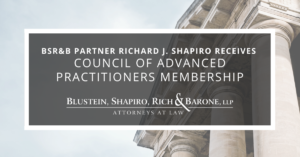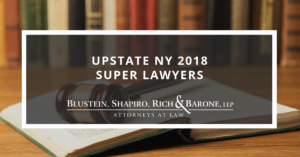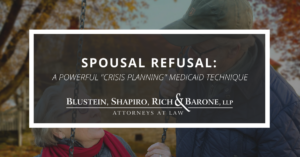Wealth Preservation
SECURE Act: Problem or Opportunity?
On December 20, 2019, President Trump signed the Setting Every Community Up for Retirement Enhancement (SECURE) Act. The SECURE Act, which took effect January 1, 2020, is the most impactful…
Read MoreShapiro Selected for Council of Advanced Practitioners Membership
Blustein, Shapiro, Frank & Barone, LLP is proud to announce that Partner Richard J. Shapiro has been selected as a member of the Council of Advanced Practitioners (CAP) by the…
Read More4 Trusteeship Misconceptions in a Special Needs Trust
Special Needs Trusts have two primary objectives: Fiduciary management and government benefit eligibility. Special Needs Trusts provide fiduciary management and oversight for individuals who are unable to take direct custody…
Read MoreFunding – the “Glue” of a Successful Estate Plan
When most people think about their estate planning, they usually focus on whether they should have a will or living trust as their primary estate planning document. This “debate” (which…
Read MorePassing The Pitchfork
Through proper and proactive planning, the farmer can protect the farm in the event the farmer becomes disabled without prematurely giving up control of the farm. Importantly, having a plan…
Read MoreAre Farm Breweries The Answer For A Suffering Agriculture Industry?
In the Hudson Valley, we have a longstanding tradition of farm wineries. However, today with both national and local family brands of craft beers, spirits, and ciders coming into the…
Read MoreUpstate New York 2018 Super Lawyers
Continuing on a legacy of achievement, BSF&B Partners Gardiner “Tad” Barone, Richard J. Shapiro, Austin F. DuBois, and William A. Frank have all again been recognized as Top Rated Lawyers…
Read MoreCongratulations, Megan!
BSF&B Associate Megan Conroy was recently honored as an Orange County Rising Star by the Junior League of Orange County, NY, Inc. It was a well-deserved honor for a hard-working…
Read MoreAsset Transfers That Are Exempt From Medicaid Penalties
Under the Medicaid “look back” rules, gifts made by a nursing home resident within the five-year period preceding the date of filing a Medicaid application are scrutinized by the Department of Social Services to…
Read MoreSpousal Refusal: A Powerful “Crisis Planning” Medicaid Technique
For many married couples of advancing age, their greatest fear is that they may be forced to deplete virtually all of their assets if one or both requires long-term care.…
Read More









